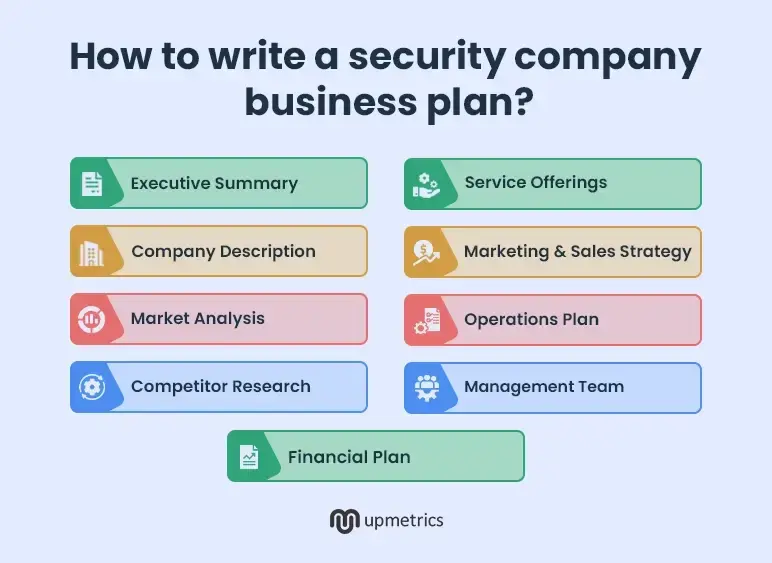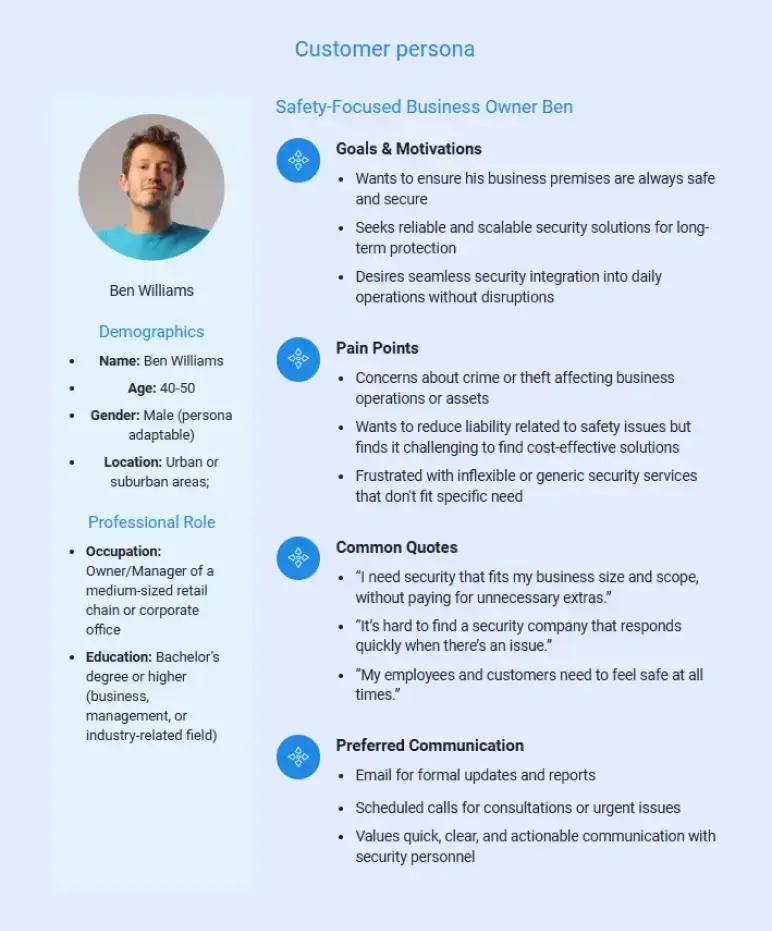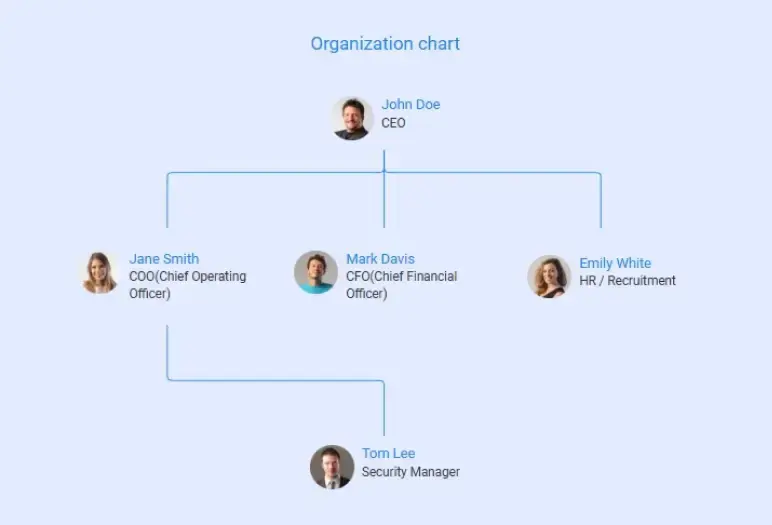Starting a security company is an exciting venture. You may be dreaming of a successful business with skilled guards, important clients, and a strong reputation.
But before you start, one key step is essential: creating a business plan.
A well-written business plan will help you manage your day-to-day operations, attract potential clients, stay legally compliant, and keep your finances in check.
Not sure how to draft one? No worries!
This simple guide, along with a free security business plan template, will help you structure every part of your plan.
What is a security agency business plan?
A security agency business plan is a detailed document that explains how your security business will run and grow. It encompasses your business objectives, the services you’ll provide, your target market area, competition, marketing tactics, and financial forecasts.
Basically, it’s a blueprint for running your business, from services such as guard patrols to day-to-day operations and profit.
Why do you need a business plan for a security agency?
Your security agency needs a business plan because it provides direction for your business. Without a plan, you risk missing important details, which can lead to mistakes or missed opportunities.
Here are six reasons why your business needs a plan:
- Helps set clear goals: Helps you put together short- and long-term goals for your business.
- Assures legal compliance: Reminds you of permits, licenses, and insurance requirements.
- Attracts clients and investors: Establishes credibility and demonstrates you have a clear plan.
- Aids in identifying typos early: Assists in identifying any subtlety or omission before they turn into an issue.
- Makes it easy to decide: You’ve got a framework for how you can operate your business.
- Gives confidence: Demonstrates that you’re committed to your aspirations and able to succeed.
Overall, a business plan keeps your security agency on track and aligned with your objectives. It also provides prospects/clients/investors/lenders with assurances that you have a plan for success.
With a clear plan, you’ll have the benefit of being able to expand your business without making expensive mistakes.
How to write a security company business plan?
Every effective security agency business plan includes several key sections. Below, we break down each component and what to cover.

1. Executive Summary
The executive summary is a quick preview of your security company’s business plan. It is an elevator pitch – short, interesting, and to the point – to your business, highlighting the main points.
Here’s what to cover in your plan summary:
- Company overview: Who are you, and what services do you provide?
- Target market: Your target customers, and from where you do business?
- Unique value proposition: Why are you different, such as specialized personnel or cutting-edge equipment?
- Business objectives: General goals, such as acquiring 10 customers in year one or diversifying services.
- Major financial projections: High-level revenue and profitability projections.
- Funding request: If seeking funding, mention how much you’ll require, and what the funds will be utilized for
The executive summary should answer the who, what, and why of your business. Even though it’s at the start of your plan, it’s best to write it last, once you’ve outlined all the details in the rest of your business plan.
Say goodbye to boring templates
Build your business plan faster and easier with AI
Plans starting from $14/month

2. Company Description
Now, it’s time to describe your security company in more detail!
The company overview section gives the basic details about your business. It should start your company’s story and set the stage for the rest of the plan.
Elements to incorporate in your company overview:
- Company history & inspiration
- Legal structure and ownership
- Mission and vision statement
- Services and solutions
- Future goals
- Company values
Overall, this section gives a snapshot of your security company’s identity and strategy.
By the end of this section, the reader should have a clear understanding of who you are, what you do, and what your business aims to achieve.
3. Market Analysis
Before you start offering security services, it’s important to understand the market you’re entering. This section helps you show that you’ve done thorough research on the security industry and your specific local market.
Conducting a market analysis will demonstrate your knowledge of industry trends, your target customers, and the competition.
While planning this section, consider including these key elements:
Industry Overview
Describe the current state of the security industry.
Mention trends affecting the market, such as increasing demand for private security services or regulatory changes that could impact your business.
Local Market Research
Provide details about the local market, such as the demand for security services in your area, and include any relevant data like crime rates or market gaps.
Target Customers
Identify your ideal clients and their needs. Focus on specific segments, such as residential or commercial clients, and describe the problems they face, like security gaps or high costs.
Explain how your services will solve these issues and meet their needs directly.

Regulatory Environment
Briefly mention the regulatory context in your area, including necessary licenses or certifications for security firms.
This shows that you’re aware of legal requirements and that being compliant gives your business a competitive edge.
By conducting a detailed market analysis, you’ll show potential investors, clients, and partners that you understand the industry, the demand for security services, and how your business fits into the local market.
4. Competitor Research
For the private security industry, there can be a lot of competition. To stand out, you need to do competitor research. This will show that you’ve had a good analysis of your competition and know exactly what your company will stand out as.
In this section, you’ll identify the top competitors, look at their strengths and weaknesses, and explain how you’re going to put something better out there.
You need this research to create a good marketing plan and sell your competitive advantages to investors.
Here’s how to approach this section effectively:
Step 1: Identify and list all the major competitors in your area. This could include both large national security companies that have affiliates in your area and smaller local security companies.
Step 2: For each major competitor, list out their focus, strengths, and market position. Add in how long they’ve been in business and any specializations they may have.
Step 3: Compare the services and pricing of your competition. Look at whether they have more expensive services or more competitive pricing, and where your business can offer more value or better service.
Step 4: Explain how your business will stand out from other companies. Maybe it will be better customer service, the latest technology, or more flexible contracts.
Step 5: Find any gaps in your competitors’ services. Look for areas that aren’t meeting customer needs and explain how your company will fill those gaps.
Step 6: Create an action plan based on what you found. Take this analysis and use it to properly position your business and identify how you’ll attract clients and outperform your competition.
All you can do is complete these steps to show you have an understanding of the competitive environment and a clear strategy for success in the market.
5. Service Offerings
This section of your security business plan details what exactly you’re offering to customers, how clients will engage with and pay for your security services.
Start by outlining your core offerings. Typically, for a security company, this includes services like on-site security guards, mobile patrol services, event security, personal protection, security consulting & risk assessment, alarm monitoring & response
Next, list any additional services or features that enhance the client’s security experience. For example:
- Do you use technology like a guard tour tracking system (where clients can see reports or GPS logs of patrols)?
- Do clients get monthly security reports or incident summaries?
- Perhaps you have a rapid incident response team or use K9 units for specialized tasks.
Mentioning these can differentiate your offerings.
Lastly, discuss your pricing strategy. How are you going to price each kind of service? For instance, hourly fees for guards, fixed fees for mobile patrol services, or subscription-based alarm monitoring.
If applicable, compare your fees with local competition to make sure that your rates are competitive and market-consistent
While writing this section, focus on how these services meet the specific needs or desires of your clients.
6. Marketing and Sales Strategy
No matter how skilled you are as a security provider, clients won’t come knocking on your door without a solid sales and marketing strategy. You need a clear plan to attract prospects, convert them into clients, and keep the business flowing.
This section of your plan covers how you’ll market your services to draw attention and how you’ll close sales to generate revenue.
Essentially, how will you connect with potential clients and convince them to choose your security agency?
Marketing strategy
The goal here is lead generation—getting your name out there and making sure people want to reach out. Consider using multiple channels and tactics, such as:
- Build a professional website to showcase your services and credentials
- Use social media (Facebook, LinkedIn, Instagram) to share updates, client reviews, and service offerings
- Run online ads (Google or Facebook) to target your local area
- Network with local groups and business professionals
- Join your local Chamber of Commerce or sponsor community events
- Try traditional marketing like flyers, postcards, or local ads
Sales strategy
Your marketing brings you leads, but your sales strategy is how you follow through and turn the leads into customers. Your sales process should involve following up rapidly on the leads, giving consultations to measure the needs of the client, and offering tailored solutions.
You must establish effective relationships with clients to guarantee customer satisfaction and build repeat business. Having clear sales goals and evaluating your success will keep your salespeople focused and motivated.
This approach demonstrates that you’re genuinely working to develop your business rather than sitting and waiting for the clients to walk in.
7. Operations Plan
The operations plan details the day-to-day processes and logistics that will keep your security agency running smoothly. While previous sections focus on what you’ll offer, the operations plan explains how you’ll deliver these services.
The following are the key elements to cover in your operations plan:
- Where will you operate from? Will you have an office or work from home initially?
- What tools and equipment are needed? Consider uniforms, radios, vehicles, and software for scheduling and reporting.
- Who will take care of the operations? Will you start alone or hire a team? Outline your hiring plans.
- How will you deliver services? Explain the steps, from site assessments to incident reporting.
- How will you stay in contact with clients? Detail how you’ll communicate and track client needs.
- How will you ensure service quality? Discuss protocols, training, and quality checks.
In short, this section should demonstrate that you have the right tools, systems, and processes in place to ensure smooth, reliable operations. Efficient operations lead to better service and profitability.
8. Management Team
Investors and stakeholders bet on individuals as much as on concepts. The management team section identifies who is behind the company and why they are able to make it work.
If you’re the sole founder, start by introducing yourself and describing your qualifications. Outline your experience and expertise. Mention any relevant certifications or leadership roles that add credibility.
If you have co-founders or key team members, introduce them briefly. Include names, titles, and relevant experience.
You can also create an organizational chart to show team structure and how decisions are made. For example:

If required, mention your support system. If you have mentors or advisors, they must be mentioned here.
In short, this section should assure investors that your security business is in capable hands.
9. Financial Plan
The financial plan is where you translate all the ideas and plans you’ve discussed into numbers.
This section demonstrates the financial viability of your security agency and is often scrutinized by investors or lenders. Solid, realistic projections give confidence that your business will be profitable and sustainable.
Your security agency’s financial plan should typically include forecasted financial statements for the next 3-5 years. Here are the key components to cover:
- Revenue projections: Project income from hourly rates, flat rate fees, and additional services such as consulting or equipment sales.
- Operating expenses: Projected costs such as salaries, insurance, maintenance, rent, utilities, marketing, and supplies.
- One-time startup costs: First-time costs of registration, equipment, insurance, setting up offices, and employee training.
- Profit & loss forecast: Forecast of profits and losses, showing when profitability is likely to occur.
- Cash flow forecasting: Monthly or quarterly cash inflows and outflows to maintain an efficient cash cycle.
- Balance sheet: Summary of assets, liabilities, and equity to evaluate financial well-being.
Additionally, clearly state your assumptions (pricing, client volume, cost growth) in narrative form, and ensure that the numbers align with those assumptions.
Download a free security agency business plan template
Ready to start crafting your own security business plan from scratch? But need more assistance with that? Don’t worry! Download our free security agency business plan template PDF to get started.
This professionally designed template is specifically for security service providers, including security guards, patrol services, and consultancy businesses. Use it as a reference while writing your plan, and feel free to customize it to suit your services, style, and business objectives.
The Quickest Way to turn a Business Idea into a Business Plan
Fill-in-the-blanks and automatic financials make it easy.
Conclusion
Now that you’ve explored this guide and received a free template, drafting a business plan for your security company should be much easier.
If you’re still unsure about the details or need a more streamlined way to write your plan, Upmetrics can assist you. With its advanced AI features, Upmetrics simplifies the planning process, saving you time and effort.
It also provides accurate financial forecasting, market analysis tools, and resources to help you create a professional plan that attracts investors.
Don’t wait; Start planning today!



